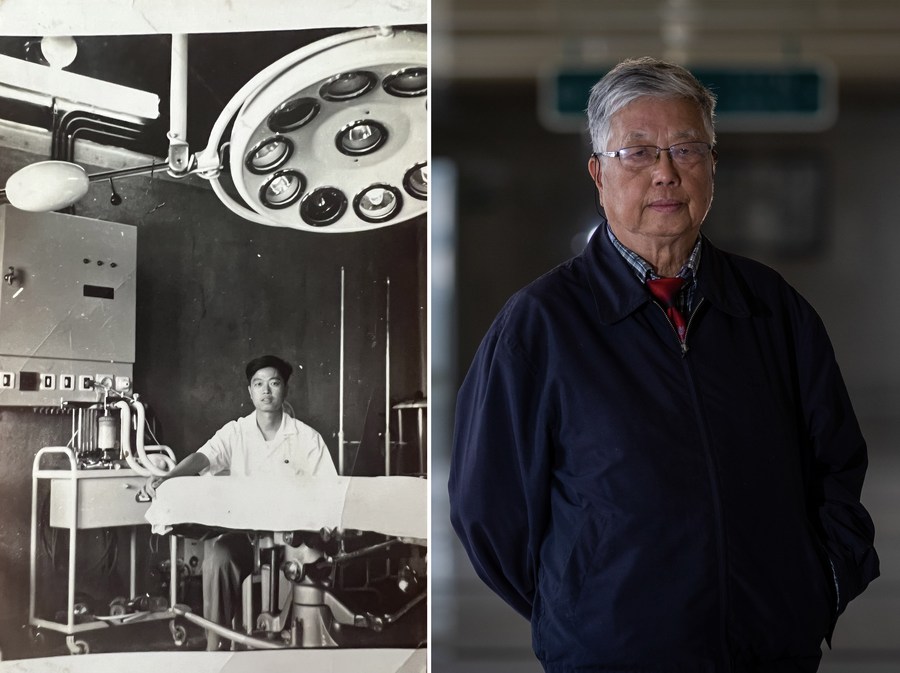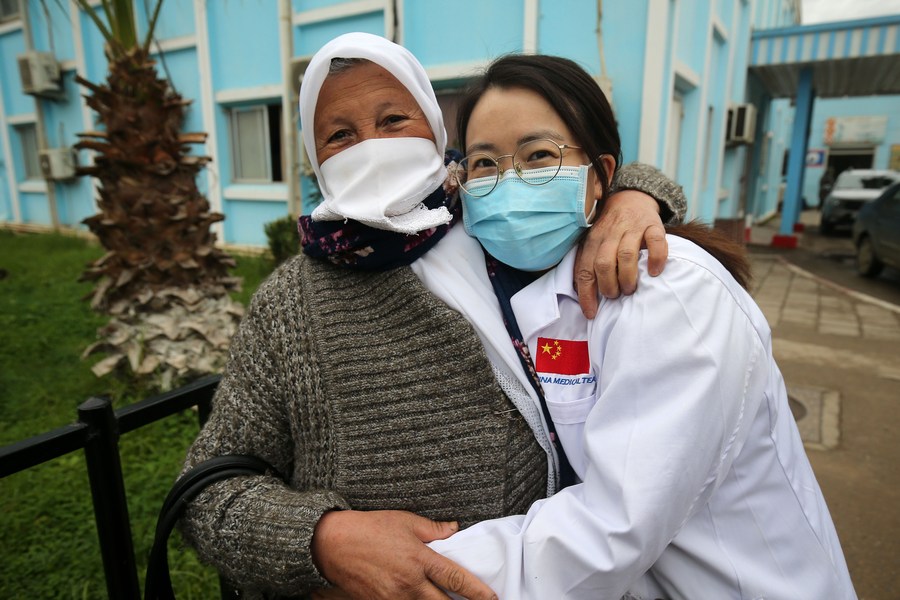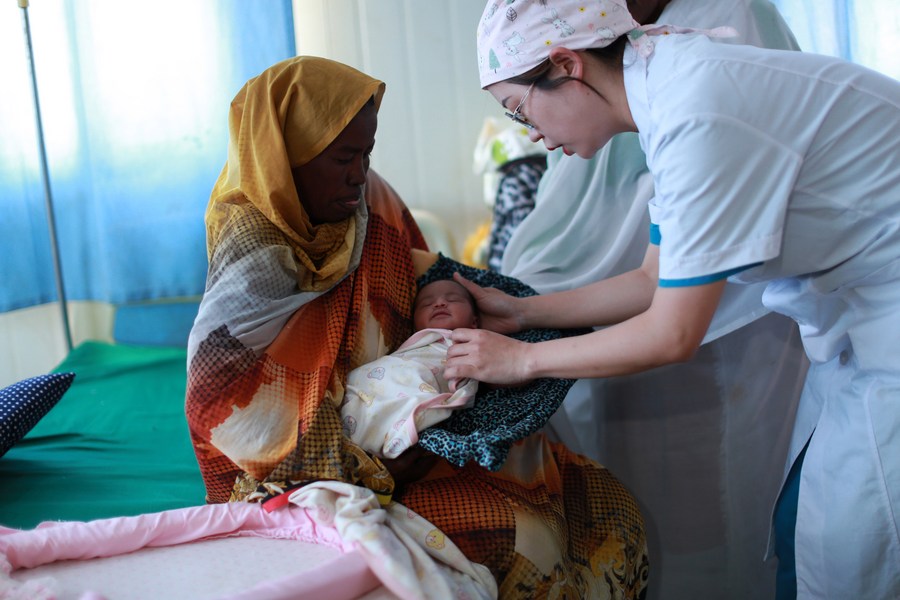For six decades, China has dispatched 3,500 medical personnel to Algeria, providing essential medical aid and services to the local people and fostering China-Arab friendship.
ALGIERS, April 6 (Xinhua) — On April 6, 1963, China’s first medical team was dispatched from Beijing to Algeria. Since then, batch after batch of Chinese doctors have been working in Africa, offering much-needed medical aid and services to local people.
Despite facing numerous difficulties and challenges, Chinese doctors have persevered in their efforts to save lives, treat illnesses, forge new friendships, and promote goodwill throughout Africa.
Their unwavering commitment, sense of duty, and exemplary expertise have earned them a reputation as the most welcome guests on the African continent, endearing them to countless Africans.
As China and Africa strive to build a community with a shared future in the new era, including building a global community of health for all, the Chinese doctors serving on aid missions in Africa have become shining exemplars with their great contribution to the lofty cause.
This combined photo shows a copy photo of Xue Jin at a hospital in Algeria on Aug. 26, 1967 (L) and Xue Jin posing for a photo at Hubei Cancer Hospital in Wuhan, central China’s Hubei Province, on March 14, 2023 (R). In 1965, Xue Jin, a 29-year-old surgeon at the Hubei Medical College Second Hospital, became the youngest member of a Chinese medical team that was sent to assist a hospital in Saida, a city in northwestern Algeria. (Xinhua/Rao Rao)
CHINA’S UNSHAKABLE COMMITMENT
Since the first Chinese medical team arrived in Algeria in 1963, China has dispatched around 30,000 medical personnel to 76 countries and regions across five continents, with a primary focus on Africa, providing 290 million diagnoses and treatments for local people, according to the National Health Commission of China.
This significant effort underscores China’s unwavering commitment as a major country to deliver public goods to the international community.
Wu Yilun, an ultrasound doctor at Xi’an Honghui Hospital in Shaanxi Province, China, has completed three separate two-year stints in Sudan. Notably, three other members of Wu’s family, including his uncle, sister, and brother-in-law, have also provided medical aid in Sudan over the past 21 years.
“For me, joining the medical team to Africa is not only a family legacy but also our mission and obligation as a Chinese doctor,” he told Xinhua.
Shen Ali, an anesthesiologist at Ying Cheng Chinese Medicine Hospital in central China’s Hubei Province, followed the footsteps of his grandfather and uncle to join the Chinese medical teams dispatched to Algeria.
Through a relay between father and son, husband and wife, and even sisters working hand in hand, Chinese doctors have never left the African continent in the past 60 years, passing on the baton of the aid mission from one generation to the next.
It is never easy for the Chinese doctors to settle down far away from home, not to mention that the hospitals where they work in Africa are usually in remote areas with harsh conditions.
Patient Alili Kheira (L), 63, goes to the hospital to thank Li Hongling, a member of the Chinese medical team to Algeria, at a hospital in Ain Defla, Algeria, on Feb. 27, 2023. (Xinhua)
FILLING MEDICAL GAPS
Chinese doctors have made significant contributions to health care in local communities over the past 60 years, with their efforts spanning not only diagnoses and treatments but also pioneering surgeries to help bridge the medical gaps in the host countries.
In Sudan, the Chinese medical team successfully conducted the first open-heart surgery in 1977 at the China-Sudan Abu Osher Friendship Hospital, said Mohamadain Hussein, former head of the hospital. The Sudanese girl who received the surgery is now a mother of five children.
In Algeria, the first femoral head replacement operation in the Khenchela Province was successfully performed in 2011 by Tu Dachun, an orthopedic physician from central China’s Hubei Province. Tu, now on his last mission in Algeria, has worked in the North African country for 12 years.
Du Bingbing, head of the current Chinese medical team to Tanzania, successfully conducted a laparoscopic radical operation of congenital hypertrophic pyloric stenosis for a one-week-old baby. That was the first minimally invasive laparoscopic surgery done in Tanzania.
Chinese doctors have also successfully conducted the first cardiac pacemaker implantation in The Gambia, the first craniectomy in Benin, and the first replantation of a severed right upper arm in Mozambique, to name a few.
Falciparum malaria is a high-incident disease in Africa. Bai Chunmei, a Chinese malariologist, had worked for more than four years in Sudan, Cameroon, and the Democratic Republic of the Congo, helping establish malaria control centers and cure those who suffer from the disease.
Chinese doctors have also introduced traditional Chinese medicine (TCM) to Africa, including acupuncture, which is gaining popularity in many African countries.
Hu Changrong, a member of the Chinese medical team to Tunisia, inspects eyes of an old man during a free clinical activity in Tunisia’s northwestern province of El Kef, on Feb. 19, 2023. (Xinhua/Xu Supei)
ANGELS IN WHITE
“The Chinese people love peace and cherish lives, which is vividly illustrated by their efforts in international medical assistance,” Chinese President Xi Jinping said in February in a reply letter to the 19th Chinese medical team dispatched to the Central African Republic.
Alongside providing medical assistance to various African countries, Chinese doctors have also established friendships with local people, who often regard them as close friends and even family members.
The Chinese doctors shoulder two missions in Africa, one being the “angles in white” to save lives and another being “messengers” to pass on friendship to local people, said Yang Yong, head of the 27th Chinese medical team dispatched to Algeria.
“China provided medical help timely when there was a severe lack of medical personnel in African countries after the colonial period more than half a century ago,” said Nasser Bouchiba, president of the Africa-China Cooperation Association for Development in Morocco.
Chinese doctors usually work in remote areas with harsh conditions, playing “a significant humanitarian role” in helping improve local health care, Bouchiba told Xinhua.
China’s continued dispatching of medical teams to Africa over the past six decades is “the best illustration of China’s internationalism and responsibilities as a major country,” he added.
Liu Wei, an obstetrician and gynecologist of the Chinese medical team to Sudan, examines a newborn at Abu Osher Hospital in central Sudan’s Gezira State on Feb. 22, 2023. (Chinese medical team to Sudan/Handout via Xinhua)
Noureddine Djoudi, 89, a former Algerian diplomat, hailed the 60-year Chinese medical aid mission in Algeria as “a model of South-South cooperation.”
The Chinese doctors “are the most welcome guests in the African continent,” he told Xinhua. Chinese doctors cured one of his hands which suddenly lost feeling. He called it the “amazing effect” of TCM.
In Namibia, TCM has been introduced into the health insurance system through unremitting efforts by Wang Peng, a member of the Chinese medical team in Namibia during 2014-2016.
“It’s a step warmly welcomed by many local patients who benefit from TCM for its curative effects,” said Ben Nangombe, executive director of Namibia’s Ministry of Health and Social Services.
Pierre Somse, minister of public health and population in the Central African Republic, said the Chinese medical teams not only treat patients and save lives but also have touched the local people with their medical ethics and great love.
“The Chinese medical team has been deeply integrated into the daily life of the people of Zanzibar,” said Nassor Ahmed Mazrui, Tanzania’s Zanzibari minister for health, praising the Chinese doctors as “true angels in white.”
Source : http://en.people.cn/n3/2023/0407/c90000-20002413.html









